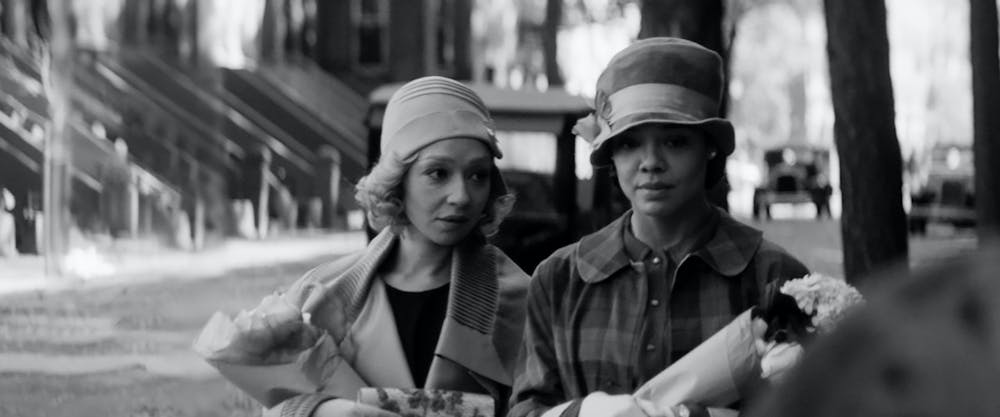Review: ‘Passing’ is a must-see product of its actors’ skill and excellent direction

Rating: ★★★★
Early in “Passing,” the movie’s protagonist Irene Redfield (Tessa Thompson) declares, “I have everything I’ve ever wanted.” This is a pretty good sign that Redfield, in fact, does not have everything she has ever wanted. At first glance, Redfield has a picturesque life: two children, an attractive doctor husband and a maid to tend to their beautiful house. But through a well-constructed slow burn plot, “Passing” reveals that Redfield has merely repressed her discontent.
Based on a 1929 novel of the same name, “Passing” follows Redfield and her reconnection with a childhood friend, Clare Bellew (Ruth Negga). Redfield and Bellew, both Black women, run into each other in the lobby of a white-only hotel. While Redfield identifies as Black, she used her ability to “pass,” or be perceived as white, to shop for a gift in a predominantly white area before escaping the heat in the hotel. Bellew, meanwhile, presents as a white woman in her daily life and is married to an openly racist white man. While Redfield is vocally uncomfortable with Bellew’s decision, Bellew is confident in her choice, arguing it creates the opportunity for a better life for her and her daughter.
Navigating discussions of racism causes the largest cracks in Redfield’s precarious marriage as she and her husband disagree about how and if they should teach their children about the reality of being Black in 1920s America; Redfield wants to preserve her children’s innocence by avoiding the topic while her husband advocates that they be more open with their children about race and the impact it has on their lives.
As a movie that relies on subtlety in its storytelling, “Passing” succeeds in large part because of Thompson and Negga’s performances, supported by the direction of Rebecca Hall. Thompson and Negga both communicate vast depths of emotions and experiences through a simple stare, and Hall gives them the room to excel with frequent close-up shots and a tight aspect ratio.
Hall chose to shoot this movie in black and white and a 4:3 aspect ratio rather than the typical widescreen format. “Passing” is a perfect example of what both of these styles can bring to a movie. The black and white cinematography lets Hall manipulate the lighting in each scene to show the mutability of the actors’ skin color, enriching the discussion of racial issues and the idea of passing. Additionally, this aspect ratio eliminates much of the background that the audience would usually see, focusing the camera instead on the central performances of Negga and Thompson.
While “Passing” is mostly a stand-out debut feature from Hall, at times the movie loses some of its polish. So much of “Passing” is a sensory experience, dealing in purposeful ambiguity. At one point, however, Redfield asks, “We are all passing for something or other, aren’t we?” To hit the nail so directly on the head here seems at odds with that seemingly intentional ambiguity. Conversely, Hall also leaves some aspects of the film underexplored, particularly the relationship between Redfield and her husband.
Nevertheless, it’s clear the care that Hall and her cast put into adapting a book which explores such a relevant and complicated topic. “Passing” is well worth watching, beginning at a deliberate crawl and carefully building to a tense and claustrophobic third act on the back of two excellent performances from Thompson and Negga.
More from The Rice Thresher

Study Abroad Photo Contest spotlights global experiences
For the first time since the Covid-19 pandemic, students gathered in the Ley Student Center to celebrate global experiences through photography.

Review: "The Crux" Should Redefine Djo
Joe Keery’s work has been boiled down to Steve Harrington from “Stranger Things,” but this label shouldn’t define his 10 years in the entertainment industry. Keery, under his stage name “Djo", is the voice behind the TikTok hit “End of Beginning,” which was released with his album “DECIDE” in 2022 and climbed the charts for the first time in 2024. With “The Crux”, Keery’s third album, he tries to separate his work as Djo and an actor, evidenced by the album’s visual of Keery escaping a building.

Review: “Lonely People With Power” merges blackgaze fury with dreamy introspection
Fifteen years into a storied career that’s crisscrossed the boundaries of black metal and shoegaze, Deafheaven has found a way to once again outdo themselves. “Lonely People With Power” feels like a triumphant return to the band’s blackgaze roots, fusing massive walls of guitar-driven sound with whispery dream-pop interludes, recalling their classic album trio of the 2010s (“Sunbather,” “New Bermuda” and “Ordinary Corrupt Human Love”). It also bears the learned refinements of “Infinite Granite,” the 2021 album where they dabbled more boldly in cleaner vocals and atmospheric passages.

Please note All comments are eligible for publication by The Rice Thresher.